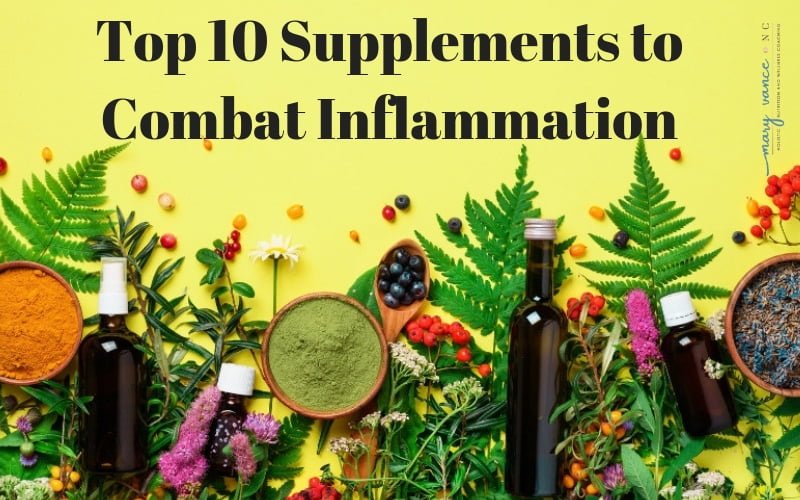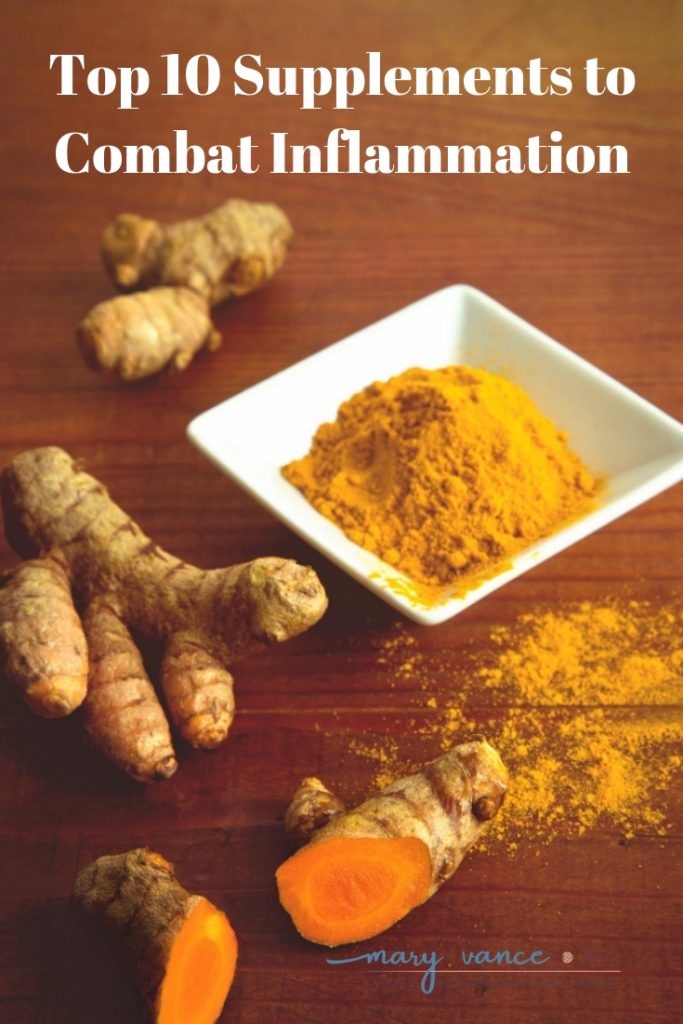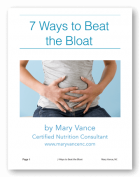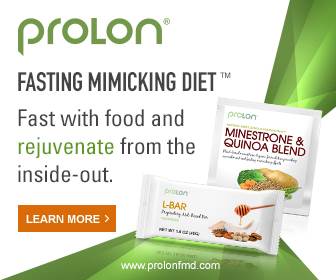Inflammation is a necessary part of the body’s immune response. But research is showing that chronic inflammation may be the common factor in many diseases. (source) If you’ve been told by a doctor that you have inflammation, or if you have joint pain or any “-itis” condition, you’ll first and foremost need diet and lifestyle modifications. Additionally there are many herbs and nutrients that are powerful anti-inflammatories you can use without the scary side effects of steroids and prescription drugs.
What is Inflammation?
Think about what happens when you cut your finger: It swells and turns red and warm as your body sends white blood cells to the injury site to prevent foreign invaders from causing infection. Or if you sprain your ankle or burn yourself, the resulting inflammation is all part of the healing process. Antibodies and cytokines, a protein involved in cell signaling, are produced to “turn on” and trigger the immune system so it gets to work. The swelling caused by this reaction is inflammation, and it is good, in this instance. This is acute inflammation. Chronic inflammation is another story.
Chronic, ongoing inflammation occurs when the triggering agent isn’t entirely eliminated after the body has addressed an invasion, so the immune system remains active and continues to produce cytokines that damage the cells over time. It’s akin to a slow burning fire that never gets extinguished. In some cases, a chronically stimulated immune system triggers autoimmune (AI) disease. While all autoimmune conditions are associated with inflammation, rheumatoid arthritis, ongoing inflammation of the joints, is the most common inflammatory AI condition.
Inflammation is at the root of all major diseases such as cardiovascular disease, cancer, diabetes, Alzheimer’s, asthma, eczema, and even obesity. Many doctors now recommend adding hs-CRP to your blood work to measure inflammation. C-reactive protein (CRP) is a protein the liver makes when there is inflammation in the body. Low levels (under 0.9) are great; 1-3 is still considered OK but getting into risky territory, and above 3.0 indicates high risk for inflammation. Elevated homocysteine also indicates inflammation.
You may not show any symptoms if you have chronic inflammation, but here are some common signs:
- Ongoing, irritating joint or muscle pain
- Allergies or asthma
- High blood pressure
- High blood sugar (over 100 fasting glucose)
- High cholesterol (specifically LDL over 140)
- Ulcers, mouth sores
- Irritable Bowel Syndrome, other digestive issues
- Fatigue
- Chronic skin problems or irritations, rashes
- Depression
- Overweight, “spare tire” around midsection
- High homocysteine on lab work; hs-CRP over 3.0
What Causes Chronic Inflammation
Smoking, obesity, being sedentary, chronic stress, and alcohol all cause inflammation. Diet is a huge culprit too: Processed foods that contain chemicals, damaged fats (hydrogenated), rancid vegetable oils (corn, soy), refined carbs (like white flour, pastries), too much sugar, non organic red meat, and fried foods all contribute to inflammation over time. Additionally, consuming foods to which you may be intolerant, such as eggs or dairy, can cause inflammation. That obviously varies by the individual. You can test your food sensitivities with a simple at-home food allergy test. Read more about that here. You can order the test here.
How to Combat Inflammation
The best place to start is your fork. Ditch the above inflammatory foods, and make your plate at least 50 percent vegetables of all types. 75 percent is better. The best options are dark leafy greens and cruciferous. Cut down on red meat in favor of wild, fatty fish like salmon. Add walnuts and chia seeds. Berries, especially blueberries, are very anti-inflammatory. Turmeric, olive oil, and green tea are excellent additions to combat inflammation also. Think modified Mediterranean diet. I don’t recommend the numerous servings of grains recommended on the Mediterranean diet, but the veggies, legumes, fruit, and fish are great. You can read my recs on how to eat anti-inflammatory here.
Address your stress levels; get good sleep (priority above all); exercise; normalize your weight, and reduce chemical exposure. Don’t smoke, and cut down on or eliminate the booze completely.
Historically doctors have recommended aspirin or NSAIDs (non-steroidal anti-inflammatories) and steroids to treat inflammation, but these drugs all have gnarly side effects like stomach bleeding, high blood pressure, and osteoporosis.
Top 10 Supplements to Combat Inflammation
While you’re working on diet and lifestyle, you can call on supplementary support to give you a powerful anti-inflammatory boost. These supplements will not cause other harmful side effects like Rx drugs. Beware that these are not substitutes for diet and lifestyle changes! But depending on the cause of your chronic inflammation, you can choose from some powerful natural herbs and supplements. Here are my top ten.
1 Olive Leaf Extract: if you have high blood pressure, olive leaf is your top choice. It is rich in oleuropein, the anti-inflammatory polyphenol that can help lower bad cholesterol and blood pressure, improve arterial health, prevent cancer, protect against oxidative damage, and help guard against cognitive decline. (source) Olive leaf extract is also antiviral and a natural antimicrobial. I often recommend it as part of candida protocols. It’s also beneficial for the immune system, so keep it around during cold and flu season.
USE FOR high blood pressure, gut health, cancer protective, prevent cold & flu
2 Curcumin is a popular top choice and your go-to for joint pain and arthritis. Numerous preclinical studies have provided a solid basis for examining curcumin’s efficacy against many human diseases, and it carries virtually no side effects. In fact, curcumin performs just as well as NSAID drugs for chronic pain relief in study after study (you can see a list of some of these studies here). Curcumin is the main constituent in turmeric, the bright yellow ginger-looking root that gives mustard its yellow flavor. Curcumin is a powerful anti-inflammatory and antioxidant. It aids in the management of oxidative and inflammatory conditions, metabolic syndrome, arthritis, anxiety, and hyperlipidemia (high cholesterol and trigs). It may also help in the management of exercise-induced inflammation and muscle soreness. (source) Great also for liver support. You’ll need to take a supplement to get the therapeutic dosage of curcumin, which is difficult, if not impossible, by eating turmeric alone. You can read my post on how to use curcumin here. Make sure you take it with fat and pepper or it won’t be absorbed as well. I use this one.
USE FOR pain, liver detox, general inflammatory conditions
3 CBD AKA cannabidiol is my recommendation for cancer, seizures, insomnia, and anxiety. It’s a potent anti-inflammatory that also has powerful pain relieving properties. (source) Please read my post on CBD, as there is quite a bit of confusion about real CBD oil vs hemp oil. I explain the difference in the post. Most of what you see and can order online is hemp oil, which is produced from the seeds of the hemp plant, and CBD oil is produced from the flowers. Hemp oil does have benefits but not nearly those of CBD. Real CBD oil is still hard to obtain unfortunately, only available through a dispensary. I use it for sleep and occasional anxiety. It may also reduce blood pressure! (it has worked for me). From the dispensary, you can get it in strengths such as 18:1 CBD:THC, 8:1, or 4:1. I’ve been told by professionals that CBD doesn’t work as well without the synergistic effects of THC, but the THC is usually in such small doses it won’t get you high. I use 4:1 for sleep, and it works like magic.
USE FOR pain, anxiety, cancer treatment, epilepsy, insomnia, high blood pressure
4 Black seed oil has been called the remedy for everything but death. Of the many ways that black seed oil benefits the body, the main six that figure prominently in the scientific literature are its ability to help prevent cancer, diabetes, obesity, hair loss, skin disorders, and infections like MRSA. I think it’s very effective for joint pain, asthma, cancer treatment, and possibly even dysbiosis. You can read my post on how to use black seed oil here. I use and like this brand.
USE FOR pain, detox, cancer treatment, as an anti-viral & antibacterial
5 Fish oil is rich in the essential omega 3 fatty acids that relieve inflammation. They’re deemed “essential” because we must get them from diet; the body cannot produce them. Fish oil is has been fairly well studied at this point with mixed results, but many trials indicate it’s a good pain reliever and an excellent treatment (along with diet and other therapies) for cardiovascular disease. (source) People with rheumatoid arthritis who took fish oil were able to reduce their dosage of anti-inflammatory drugs, and they also reported less pain and stiffness. It may also help lower triglycerides and cholesterol due to its anti-inflammatory properties. (source) Good for brain health, too. It’s very important to source good quality fish oil, because if not properly processed, it can be rancid or contain heavy metals, both of which cause inflammation. I use and recommend this one. Nordic Naturals is also a good brand with several formulas depending on what you’re looking for.
USE FOR arthritis, brain health, high blood pressure, joint pain, cardio issues.
6 Proteolytic enzymes are another go-to for joint pain. Proteolytic enzymes refer to the various enzymes that digest protein, and they’re essential regulators and modulators of the inflammatory response.(source) These enzymes include the pancreatic proteases chymotrypsin and trypsin, bromelain (which you can get in pineapple), papain (in papaya), fungal proteases, and Serratia peptidase (the “silk worm” enzyme). They “digest” pathogenic complexes that inhibit immune function. They modulate the inflammatory process by a variety of mechanisms, including reducing the swelling of mucous membranes, decreasing capillary permeability, and dissolving blood clot-forming fibrin deposits.(source) They’re also good for shrinking fibroids. And they support digestion! “Proteolytic enzymes also help break down plasma proteins and cellular debris at the site of an injury into smaller fragments. This greatly facilitates their passage through the lymphatic system, resulting in more rapid resolution of swelling, with the consequent relief of pain and discomfort.” (source) I recommend this brand. I have also usedthis one, which is also excellent.
USE FOR arthritis, knee pain, injury recovery, fibroids, elevated CRP
7 Alpha lipoic acid (ALA) is a personal fave. I’m a big fan of the multi taskers, and this is one of ’em. ALA is actually a coenzyme that has lots of talents. It’s an antioxidant and anti-inflammatory (of course). It may lower blood sugar, protect the liver, and is used for neuropathy and to heal nerve damage. I used it with great success as part of my protocol to heal hyposmia (you can read about that here). I recommend this one. If you’re looking to lower blood sugar, use this berberine-ALA combo supplement.
USE FOR type 2 diabetes, liver detox, nerve damage
8 Ginger looks a lot like turmeric root but won’t stain everything yellow. It’s also a prokinetic, meaning it supports digestion and helps you poop. Great for nausea, bloating, and morning sickness. Ginger is a warming root that boosts circulation and reduces pain thanks to gingerols, which have a powerful anti-inflammatory effect. You can take it freshly grated as a tea or in a tincture (but it’s strong and spicy and may burn).
USE FOR pain (but may take months to work), digestion, circulation
9 Quercitin is a flavonoid found in fruits and vegetables and is your guy if you suffer with seasonal allergies. It’s a powerful natural anti-histamine, meaning it blocks the release of histamine that causes allergy symptoms. Quercitin has a wide range of biological actions including anti-carcinogenic, anti-inflammatory and antiviral activities. (source) For allergy relief, I recommend this supplement. This is another good option for quercitin supplementation.
USE FOR seasonal allergies, gout, pain, general inflammation relief
10 Cat’s Claw is an herb native to South & Central America. Researchers have discovered that cat’s claw exerts powerful anti-inflammatory and antioxidant effects that support DNA repair (making it cancer protective), joint health, immune function, and normal cell division. (source) South Americans used it to ease conditions such as fevers, arthritis, stomach ulcers, dysentery and inflammation. The ancient Incan civilization used cat’s claw for viral infections and for immune system stimulation. (source) It’s a potent anti-viral. It’s often used as part of leaky gut healing to reduce inflammation. It may also lower blood pressure and increase white blood cell counts. I’ve read a few contraindications: don’t use if trying to conceive. And because it stimulates immune response, it may aggravate autoimmune conditions, BUT I’ve also read it’s excellent for rheumatoid and joint pain. (source)
USE FOR leaky gut, immune protection (would be great for protection when traveling or around sick people), arthritis. You can use it as a tea, but I highly recommend this form.
BONUS–> Antioxidants: many of the herbs and nutrients mentioned here pack a powerful antioxidant punch. By nature antioxidants are anti-inflammatory and quell free radical damage in the body. That’s how they prevent oxidation and aging.The antioxidants are vitamins A, C, E, zinc, and selenium, and it’s best to obtain antioxidants from your diet: green tea, blueberries, pomegranate, turmeric, leafy greens, spirulina, 80% or higher dark chocolate, and cruciferous veggies are some of the best sources. Supplementing is warranted for people who are exposed to chemicals, or for cancer treatment, or who take certain meds that may cause deficiencies. This is a great full spectrum antioxidant supplement.
USE FOR chemical exposure (if you’re a painter, hair stylist, mechanic, artist, for example), chemo, anti-aging
Have you used anti-inflammatory supplements? How have they worked for you?
Pin it!

Mary Vance is a Certified Nutrition Consultant and author specializing in digestive health. She combines a science-based approach with natural therapies to rebalance the body. In addition to her 1:1 coaching, she offers courses to help you heal your gut and improve your health. Mary lives in San Francisco and Lake Tahoe in Northern California. Read more about her coaching practice here and her background here.








Thanks for sharing this detailed and super-informative post, Mary!
I like how you emphasized food & lifestyle changes before going over the supplements!
Speaking about that, different types of fasting have been shown to greatly reduce inflammation. Especially water fasting, when the body enters the autophagy and self-cleaning mode. This ancient practice is somehow marginalized nowadays, although it’s been used successfully for ages.
Thanks for the info about olive leaf – gotta look into this!
Resveratrol and glutathione are two powerful antioxidants that also fight inflammation.
Best wishes and keep up the great work!
Thanks for sharing the wonderful article on CBD and its health benefits. I used to be very irritating because of insomnia. One of my friends recommended me about CBD Products. Then I started researching about CBD and came across a website https://cbdvapegenius.com/brands/cbd-for-the-people . Taking a dose at night helped me to overcome the problem of insomnia. Now I wake up in the morning fresh and energetically. Apart from my story, let me tell you that I love your article and will share it with my friends. Thanks for sharing great information!
Nice blog, thanks for posting.